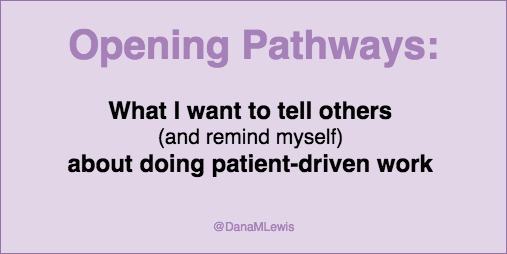What I want to tell others doing patient-driven work
I’ve recently had the opportunity to talk to several individuals who are working on patient-driven projects in a variety of categories. Some of the things I’ve shared with them are things I’ve learned that I wish I had known when I started this grant work, or that I wish I’d known even earlier when I started working on open source projects. This is my attempt to write some of these down in case it helps others, and also as an ongoing reminder to myself.

1. If it’s hard and messy, that probably means it’s worth doing.
If no one is doing what you’re doing, there’s some chance you’re doing something that can’t be done. But there’s also a chance that there’s an (ultimately) simple solution that can be very effective, and everyone else has missed it or made incorrect assumptions about what’s possible.
Identify your vision of what needs to be done, evaluate whether it is something that’s within your power to do, and if so, make it your mission and stick with it.
It can be worth doing because you’ll ultimately change your field, or invent something or a process an introduce the world to it, or save or improve a life or many lives. But it can also be worth doing for what you learn and how you learn to work. You can learn a lot about your field, or about how to research/do business, etc., or about what you need to learn in order to succeed at the next level of what you want to do next.
2. You’re not alone.
Well, you kind of are – you’re doing a thing that’s never been done before, or in the way that you’re doing it. And yes, that is HARD. Let’s not understate that. It is work. And chances are, you’re not necessarily being paid for it, or even if you are, you’re giving up other opportunities.
But if you take a broader view… you’re not alone in being a trailblazer. It’s hard, and it’s lonely, but there are others also out there on the prairie doing their thing and struggling with some of the same logistical, resource, or even emotional questions.
Find them. Find ways to connect with them. This is one thing I really heard at our Convening, about the value of reconnecting with other people in the trenches doing the work, even in totally unrelated fields. Use online social media to meet others, build relationships, and stay connected.
3. Done (or in-progress) is way better than perfect (and not started).
It’s really easy to get paralyzed by fear, or wanting things to be perfect. (Ever faced the paralysis of a white page when you’ve wanted or needed to write something? Same thing).
But find a way to get started, somehow. Otherwise you’ll fall into the same traps as everyone else. Remember the tortoise and the hare. Small, incremental progress is better than no progress. And you may be surprised as you inch along about what opportunities, new tools, new people, and new stuff emerges in the world that you can better leverage when you’re somewhere along the way, rather than still being stuck, immobile, at the beginning of your journey.
4. Kick butt and keep notes celebrating milestones along the way.
One of the hard things about being a trailblazer is there’s not a clear ladder of success and milestones. And especially at the beginning as you’re figuring things out, it can be hard to realize that you’re making progress. (And possibly really hard to explain to people what you’re doing, and why it’s important, in a way they can understand.)
One thing I’ve found helpful to combat that is to keep a draft email in my inbox, with a growing bullet list of things I’ve done that I’m proud of when I finish or accomplish them. That’s evolved over the past few years – now I set some high level goals of things I want to accomplish, and under that I start the bullet list of what I’ve been accomplishing. When I get stuck, frustrated, or feel like I’m not moving the needle (enough, fast enough, etc.), glancing at that helps me. It also helps to see all the other opportunities, that weren’t necessarily goals, that popped up that I was able to accomplish or take advantage of.
These can be both personal and professional, but keeping track of small and big wins and progress, inch by inch when you’re in the weeds, can help. The journey, and the path, to doing your thing can be long, winding, and thorny - so it’s important to recognize the milestones or mileposts along the way as you go.
5. Regularly take the opportunity to evaluate and redefine what success looks like.
Related to tracking progress, milestones, and goals… be flexible and willing to redefine what success looks like.
I recently had a week where I felt frustrated because I hadn’t made any major, noticeable progress on my projects. I was struggling with jetlag and getting back into the swing of things. Even though I know this always happens, and plan for less productivity during international travel (and the few days after), it still frustrated me. What I realized was most helpful was getting productive in ANY form – including for personal stuff, and letting that momentum carry over into my ‘work’, as well.
If you need to divide up the tasks on your to-do list into many more small sub-tasks to get going and get momentum from crossing things off your list, do it. (This is probably helpful for #2, e.g. getting started on something.)
But the other tip here is to redefine what success is, including looking backward at what you’ve been doing, or looking around you to see the impact of some of your work. I have realized that in some of this grant work, while early on I focused on the ultimate output, there’s a lot of success in evaluating the work along the way.
Everything we learn from a data science project, including learning something about the way we work (or how something is not working)? That’s success. Every time we come up with a new, thorny question that we recognize is a hard thing? That’s success. (Especially because defining a problem is a step toward identifying or building a solution or rallying resources to being to address it.) And seeing the ripple effect of some of your work? That’s absolutely and spectacularly also success.
(I was reminded of that today when someone thanked me for my work and for showing some of what’s possible. I forget that that is part of what I’m doing sometimes, and I greatly appreciated that reminder.)
And sometimes being stuck, and being vulnerable, and showing what you’re doing wrong is also success.
6. Clear communication is possibly one of the most important things, and it will help in almost every area of your work.
A few days before I submitted the final, full proposal for our Opening Pathways grant, I panic-emailed my program manager. I had very firmly written the proposal my way. And generally in plain language. I pushed back on my co-PI’s, who wanted to add citations and references and academic-ese it up. I was firm. Until I panicked: what if my lack of writing like a traditional academic caused our application to get rejected, when otherwise signs pointed to interest in funding this work? Ahhh! And so I emailed the program manager, asking if I should add in references and stuff and cave to the impulse to make it like all the example grants I had seen.
No, he said. If it’s clear and we can understand it, that’s fine. If we need clarification about something, we’ll ask.
Gulp. Ok. So I submitted the proposal I had written, in my plain language style.
Well, obviously, since this is the grant project blog, we got the grant.
But throughout our work, I am continually reminded about the importance of communication. Communicating clearly with our partners in the community. Communicating clearly within our team. Communicating clearly externally to talk about our work and invite input, and also communicating clearly to extend our work further through communication at scientific conferences.
Now - I still worry/wonder sometimes about whether there’s a “better” way to communicate in a different style. But what I’ve learned is that no matter the style or format, clearly communicating your message is the most important thing. It makes a huge difference for being able to articulate your vision of your work to people less familiar with your space. It helps in inviting and recruiting people to help your or join your project/work. It helps in having a clear value proposition for people to grant resources to your work. I’ve yet to find an area where clear communication hurts your work.
And if you don’t come from a communications background or think it’s one of your weaker skill sets - don’t worry about it. Just practice. Practice speaking, writing, and communicating your message(s) in many formats. Practice and repetition and iteration are some of the core components for helping improve communication.
I’ll probably keep adding to this list, both to remember what I want to share with others, and also to keep reminding myself. For other people who are also out there working on projects, especially outside the bounds of traditional work, roles, etc. - I’d love to know what you wish you’d known when you started, too, so we can grow this list together.
